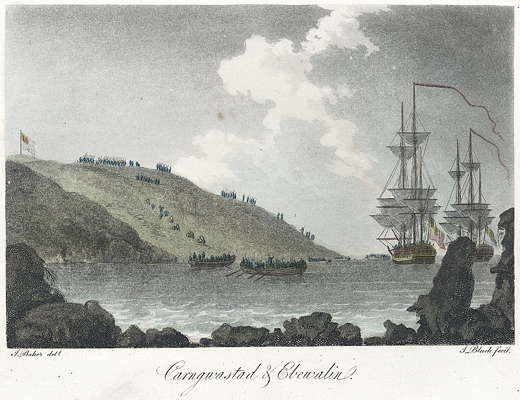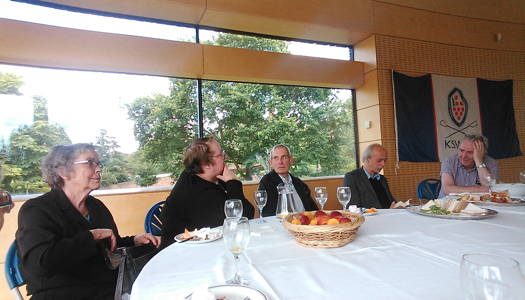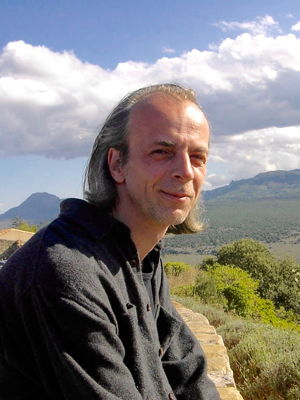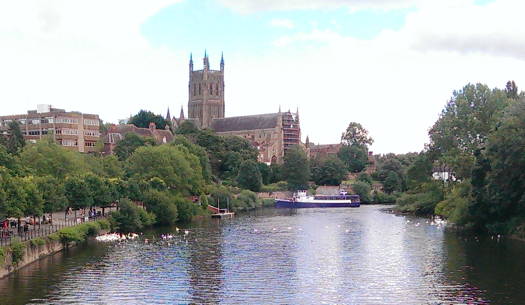|
PUNK TRANSFORMED?

KEITH BRAMICH has lunch with
Torsten Rasch, Roderic Dunnett and others,
at the Three Choirs Festival in Worcester
Under cover of darkness, on the evening of 22 February 1797, fourteen hundred French troups, all well-armed, landed at Carregwastad Head near Fishguard, Pembrokeshire, Wales. Commonly referred to as the 'last invasion of Britain', this assault by the Legion Noire is the most recent landing on British soil by a hostile foreign force. During the following two days, the (what seems, in hindsight) bizarre scenario of the ensuing Battle of Fishguard was played out. This involved the French moving two miles inland to strategic positions, but then losing control of many of their soldiers. This was partly due to their getting drunk on large quantities of wine — proceeds of the recent Welsh wrecking of a Portuguese ship. The British authorities just laughed ... the French were forced to surrender on 24 February. Add to the mix a legendary folk heroine, Jemima Nicholas, who reportedly, armed only with a pitchfork, rounded up twelve drunk French soldiers and locked them inside a local church, and a suitably happy ending — after a brief imprisonment, the French soldiers were sent home — then you have the plot for a new comic opera.

A lithograph of the French forces landing at Carregwastad in 1797. Click on the image for higher resolution
|
Something along these lines has been dreamt up by German composer Torsten Rasch (born Dresden, 1965) and his Gloucestershire friends. A libretto has been written, and this is one of several of Rasch's current projects.
This information came out during an interview, titled Lunch with Torsten Rasch, held yesterday — Wednesday 26 July 2017 — as part of the Worcester Three Choirs Festival (22-29 July 2017, Worcester, UK). Due to low audience numbers and a generous session length, this event became extremely good value for participants, since twelve of us (including Rasch and his interviewer, M&V contributor Roderic Dunnett) sat around a couple of tables in the glorious new King's School Worcester boathouse, all engaged in a very personal and fascinating multi-way conversation, held over a light lunch.

Lunch with Torsten Rasch at the King's School Worcester boathouse: Roderic Dunnett (far right) has just presented Torsten Rasch (next right) with a book, at the end of the interview. Photo © 2017 Keith Bramich. Click on the image for higher resolution
|
In fact, the pre-event audience conversation was interesting even before the arrival of our interviewer and interviewee, touching on the Dymock Poets — a group of men who lived in the village of Dymock, near the Gloucestershire/Herefordshire border, from about 1911 until 1914 — and on Welsh poet Alun Lewis (1915-1944). This information became immediately relevant to the interview's central subject, Torsten Rasch, his interest in setting English poets, and his work A Welsh Night (setting poetry by Alun Lewis), given its first performance in a new orchestral version last night in Worcester Cathedral by mezzo Sarah Connolly and the Philharmonia Orchestra conducted by Frank Beermann. The work, commissioned by Anwen Walker, was first performed two years ago, at the 2015 Hereford Three Choirs Festival, by Sarah Connolly and pianist Joseph Middleton. (Read Roderic Dunnett's review of the 2015 performance.)
Rasch explained that most early twentieth century English poets are completely unknown in Germany, and so he hadn't previously heard of Alun Lewis, but now thought that Lewis is unjustly forgotten and actually the greatest of the World War II poets. Rasch was able to meet and befriend Lewis' widow, Gweno. He needed a structure for the whole work, so he imagined a dialogue between Alun and Gweno Lewis — what they might say to one another in poetic form. (Alun and Gweno had married in 1941, but less than three years later, Alun had died mysteriously in Burma, of a gunshot wound to the head from his own weapon. Gweno spent the rest of her life promoting Alun's poetry, until her death on 13 January 2016, aged one-hundred-and-two.)
In response to a question from the audience, Rasch explained that about 70% of his compositional output involves the setting of words, and that he is definitely mostly inspired by words, and has a gift for recognising which poems or fragments of poems will, in general terms, be a good fit for his music.
Rasch has a fascinating background. Born in Dresden in 1965, his father was a builder, and he had no prior connection with music, but he sang in the Dresdner Kreuzchor, and decided to study pop music, rather than classical music. Initially, he made a living by playing keyboards in bands. When the Berlin wall came down in 1990 and he was able to travel, he wanted to get away, as far from Germany as he could, and settled in Japan, building a career there as a film music composer. Whilst in Japan, finding film work rather restricting, he started to write songs and orchestral works. A Japanese singer asked him to write a song, which was recorded in Bratislava and appeared on a CD. In 1999 he was commissioned by the Dresdner Sinfoniker to write an orchestral work. The orchestra returned in 2002 and asked him for a song cycle. This was based, unusually, on lyrics by the German band Rammstein. The result, Mein Herz brennt, began to get Rasch noticed internationally — it was highly recommended by Rob Cowan, broadcasting for BBC Radio 3, and Robin Holloway, in an article for The Spectator titled Punk Transformed, wrote 'This extraordinary work has disturbed and excited me more than any new music I've encountered for some years'. (Read Tess Crebbin's 2004 interview with Torsten Rasch and Sven Helbig.)

Torsten Rasch. Click on the image for higher resolution
|
After a couple of decades in Japan, Rasch moved to Berlin. He was taken on by Faber Music in London, and he began to get better known in the UK. Just a few months ago, he brought his family to England to live in Gloucestershire.
A Welsh Night is not Rasch's first Three Choirs work — Worcester had previously been the setting for the first performance of A Foreign Field in 2014. Jointly commissioned by the Three Choirs Festival and Chemnitz Opera, it marked the centenary of the outbreak of World War I. Rasch spoke at length about this work during our lunchtime meeting, explaining that its overall structure was modelled on the three parts of an evensong service. Firstly, a call and response section, where text by Dymock Poet Edward Thomas receives responses from the Old Testament of the Bible in Latin. The second section sets a long Edward Thomas poem, in which he describes going off to war. The third section combines schoolboys reciting Latin grammar — apparently young English soldiers did this in the trenches to take their minds off the task — with the expressionist poetry of Austrian poet and pharmacist Georg Trakl (1887-1914) and (to add some hope) by Bohemian-Austrian poet Rainer Maria Rilke (1875-1926). (Read Roderic Dunnett's review of the 2014 performance.)
Rasch was frank in discussing his experiences, telling us that he finds collaboration unhelpful when writing music, citing as an example his work with the Pet Shop Boys on a soundtrack for the silent film Battleship Potemkin. Although he likes the Pet Shop Boys, the collaboration was difficult. He completed the work, but decided not to do this sort of thing again. He was also uncompromising in discussing other composers' work, turning up his nose at the mention of Boulez or any French composers. He admires the work of English composer Humphrey Searle (1915-1982), Polish composers Penderecki (especially for his opera The Devils of Loudun, based on Aldous Huxley's novel) and Lutosławski, and German composers Richard Strauss, Webern, Berg, Schoenberg and Hartmann.
We learned that he writes his music on paper — this physical process being very important to him. Only later does he use a computer to make a typeset score. We also discussed more general issues such as emotion, language and contemporary music, with Roderic Dunnett contributing particular knowledge here, regarding dialects and other composers' use of text.
Torsten Rasch comes across as a tall, modest, earnest, knowledgeable international gentleman with a twinkle in his eye. Unlike at any other composer-in-conversation event I've previously attended, he walked around the tables at the start of the event and shook hands with everyone, and this event was successful in the very real sense that we all felt we had got to know him rather better than one normally can at such an event lasting only an hour or two. Here's to a bright future for his continued work setting Welsh and English poets!

Worcester Cathedral and the River Severn at Worcester, during the Three Choirs Festival. Photo © 2017 Keith Bramich. Click on the image for higher resolution
|
A couple of days earlier I was in the audience for an orchestral concert in Worcester Cathedral which featured organist Wayne Marshall and the Philharmonia Orchestra with young French conductor Jérémie Rhorer (Monday 24 July 2017). Festival artistic director Peter Nardone had turned the whole experience around, with the performing space under the cathedral tower, instead of by the West Window, in order to be able to programme organ concerti.
In the first half we heard Poulenc's Concerto for Organ, Timpani and Strings — a rather racy performance in which I suspect Marshall, timpanist Matt Perry and Rhorer exceeded the building's speed limit at times(!), resulting in an initial Allegro giocoso which was a bit of a scramble and occasionally not quite together. From our seats half way up the raised area at the very back, Wayne Marshall occasionally won out in volume, I thought. Actually, I think he was on tip-toes, and could probably have blown the Philharmonia Orchestra off the stage had he wanted to. Such a peculiar combination, organ and symphony orchestra. The final section — the organ cadenza leading into viola and then cello solos — was very sensitively handled, however.
Saint-Saëns' serenely optimistic and tonal Organ (and piano) Symphony in the second half fared much better — a lovely well-balanced performance with clear orchestral sound. This work appears to be almost universally loved, even by those (such as my brother, in his younger days) who don't normally appreciate 'classical' music ... perhaps even by Rammstein and the Pet Shop Boys?
But the most unusual part of this concert was the first work — the beautiful tone poem Aurora (Roman goddess of the dawn) by William Lloyd Webber (1914-1982), performed in the presence of both of the composer's famous sons. This music was lush, sensual, romantic and occasionally reminded both my friend and I of Delius. Sadly, the quiet end of this performance was marred by the sound of a mobile phone ringing ... which reminds me that I also heard people talking, filtering in from outside the cathedral, I think, at one quiet moment during the Poulenc concerto.
Relaxing in the festival marquee after the performance, I was told about the drama at the previous event, Julian Lloyd Webber in Conversation: Julian's train was late, and he had missed the first fifteen minutes of conversation with Peter Nardone. The situation was rescued by composer brother Andrew, who stepped in at short notice, and the event concluded with both Lloyd Webber brothers in conversation. There's an interesting parallel here with the Torsten Rasch lunch, in terms of absent high-profile contributors ... Roderic Dunnett was a few minutes late for lunch, and at this event the problem was solved by Torsten fielding questions from audience members around the table.
Copyright © 27 July 2017 Keith Bramich,
Worcestershire UK

More information about Torsten Rasch can be found online, including complete performances of several of his works. Roderic Dunnett plans to review the whole of the 2017 Three Choirs Festival in due course, including the first performance of the orchestral version of A Welsh Night mentioned above. The festival continues until Saturday 29 July 2017. Next year's festival is at Hereford, from 28 July until 4 August 2018. Further information can be found at www.3choirs.org |
|

